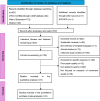The impact of eccentric training on athlete movement speed: a systematic review
- PMID: 39735722
- PMCID: PMC11671480
- DOI: 10.3389/fphys.2024.1492023
The impact of eccentric training on athlete movement speed: a systematic review
Abstract
Eccentric training has been proposed as a potential method for enhancing athletes' movement speed. However, a systematic review specifically examining the impact of eccentric training on movement speed in athletes has yet to be conducted. This paper aims to fill this gap by evaluating the effects of eccentric training on movement speed in athletes.A systematic search was carried out on May 15, 2024, in accordance with the PRISMA guidelines for systematic reviews and meta-analyses. The search was conducted across multiple databases, including Web of Science, EBSCOhost, PubMed, CNKI, and VIP, using keywords related to eccentric training, athletes, and movement speed. Out of 421 reviews screened, nine met the inclusion criteria. The quality of the studies was assessed using the PEDro scale, with an average score of 3.67 (range 3-4). The results indicated that short-distance sprint speed (n = 7) was the most affected by eccentric training interventions. Sport-specific movement speed (n = 3) and change of direction speed (COD) (n = 5) were also positively influenced, although to a lesser extent.In conclusion, eccentric training significantly enhances sport-specific movement speed and COD speed, with more moderate effects on short-distance sprinting. These findings suggest that eccentric training can be a valuable intervention for improving movement speed in athletes, especially for sports that involve rapid directional changes.
Systematic review registration: https://www.crd.york.ac.uk/prospero/display_record.php?ID=CRD42024547112, identifier CRD42024547112.
Keywords: change of direction (COD) speed; eccentric training; movement speed; sport-specific skills; training intervention.
Copyright © 2024 Zhang, Zhuang, Zhang and Sun.
Conflict of interest statement
The authors declare that the research was conducted in the absence of any commercial or financial relationships that could be construed as a potential conflict of interest.
Figures
References
Publication types
LinkOut - more resources
Full Text Sources
Miscellaneous


